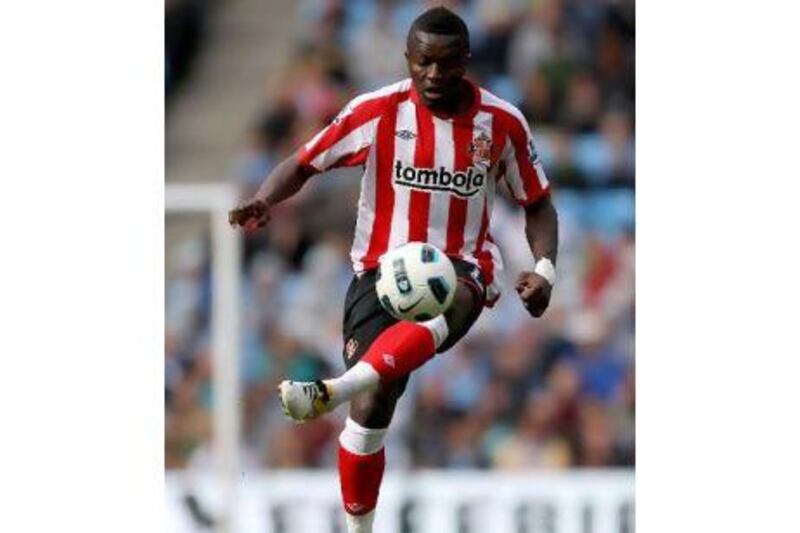Suleyman Ali Muntari has a fearsome left foot, a sharp eye for goals struck from distance, does not shy away from a rugged challenge, can measure a pass astutely over various ranges and turns into a nifty dribbler if the circumstances ask.
A very complete modern midfielder, then, explaining why some of the best coaches have recruited him at various times in a club career that has straddled Serie A and the Premier League.
But "Sulley", as most of his colleagues know him, can also be stubborn and determined to the point of confrontation. Some of his coaches for Ghana would testify to that.
His mother, Hajia Kande - a key figure in the story of one of the most successful of West Africa's many emigres to the leading leagues of Europe - would testify to that, too, Muntari said.
"I was fortunate I had a strong mother," Muntari said as he traced his journey from talented-but-headstrong schoolboy in provincial Ghana to Champions League gold-medallist, World Cup quarter-finalist, Serie A title-holder - twice - and FA Cup winner.
Muntari was born in Konongo, in the Ashanti region, in the mid-1980s. His father had been a decent local footballer who for a period moved with the family to Nigeria.
But, still a child, Sulley returned to Ghana with his mother.
It was not to a life of abundance.
"She would use the last of her money to buy us shoes," Muntari said. Her son got through pairs of them quickly. "She says when I was young I kicked everything. Even when I was ill or hurt, I went out on to a field to play."
Muntari's talent was spotted locally, but he did not have the advantages of a private education enjoyed by, say, his contemporary, Michael Essien, now of Chelsea. Still, he was good enough to be selected for a national Under 20 squad at 16, and to be invited to join the Asante Kotoko club in Kumasi. His mother was thrilled, and bewildered, when her son insisted his prospects would be better served by joining a less glamorous club, Liberty Professionals.
There he went, and would be proved right. After starring with Ghana at the 2001 World Youth Championships, his reputation soared. Udinese signed him when he was 17.
"Italy was great," he said of his first, six-year spell in Serie A. "It became a second home; the club president was like a father to me."
His game developed quickly, and the Black Stars reaped some of the benefits, Muntari becoming an important part of the 2006 side that reached a first World Cup for Ghana and made the last 16. Muntari had by then become a pathfinder for Ghanaians at Udinese.
Asamoah Gyan, now a teammate again at Sunderland, followed him there, as did Kwadwo Asamoah.
There were, he said, "too many red cards" in his first spell in Italy. Yet the combative side to his game appealed to scouts from England, where he had already, as a young teenager, had a trial with Manchester United. "I spent a week there, which then was an amazing experience, seeing the facilities. I remember a five-a-side game with Roy Keane. I saw in him a real champion, who never, not even in practice, was willing to lose."
Muntari joined the then upwardly mobile Portsmouth in 2007. "I found English football uniquely competitive, and Portsmouth was very open to African players, with Papa Bouba Diop there, Kanu, Benjani and so on."
Muntari scored the only goal of the game in an FA Cup victory over United, and would on the winning side in the 2008 final.
That would be his last match for Pompey. Two months later, Jose Mourinho made Muntari one of his key recruits, at €15 million (Dh76.5m), when Mourinho took over as coach of Inter Milan.
Two scudettos followed, though by the time Inter won the Champions League last May, Muntari was no longer certain of a starting XI place.
Nor was he sure of going to the World Cup, having clashed with the Ghana coach, Milo Rajevac, over his availability for a friendly.
The row cost him a berth in the 2010 African Cup of Nations, where Ghana finished second.
He did go to South Africa, and scored a breathtaking long-range goal with his trusty left foot that gave Ghana the lead in their quarter-final against Uruguay.
Six months later, it was time for Muntari and his wife, Manaye, a former Miss Ghana and now a prominent philanthropist, to move back to England.
He is currently on loan at Sunderland from Inter, but already important enough to the coach Steve Bruce that Bruce felt very agitated when Muntari, injured against Liverpool just before the last international break, insisted on honouring his call-up for Ghana's matches against Congo and England.
He believed he had a debt to his country after some rocky phases of his relationship with his national team.
And, as his mother, would testify, this Black Star turned Black Cat can be a stubborn individual.






